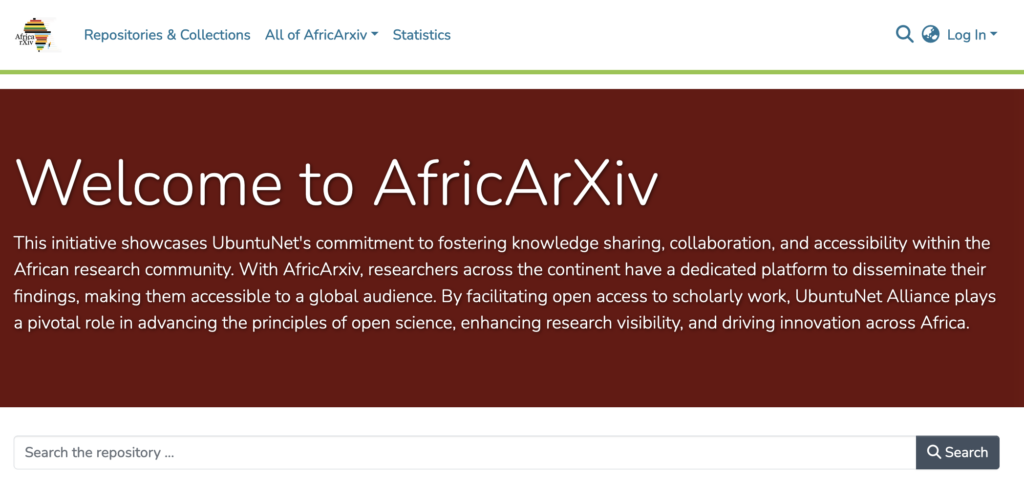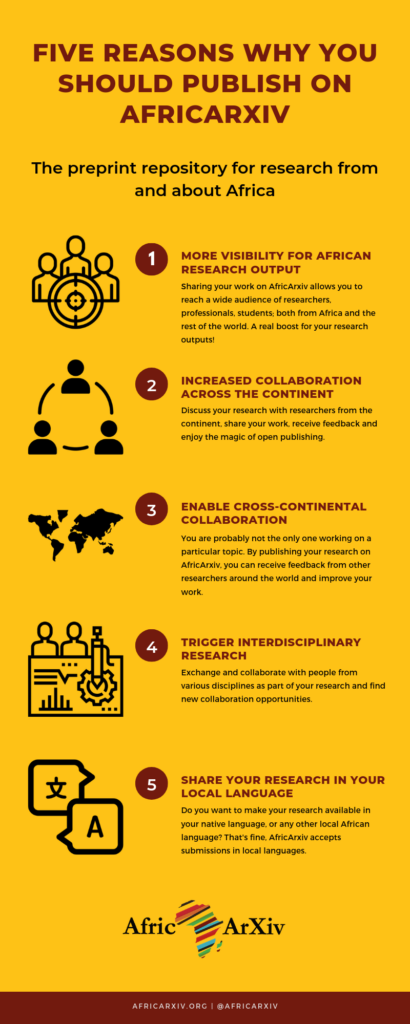Increasing discoverability of African research output
AfricArXiv is a free community-led digital archive for African research. We provide a platform for African
A new chapter
As of 2023, UbuntuNet Alliance is hosting AfricArXiv, offering features, including persistent identifiers and licensing options to maintain copyright while adhering to international licensing standards. This initiative marks the first time African researchers can archive and share their work on African servers with internationally connected digital infrastructure, addressing the under-resourced digital infrastructure for research dissemination in Africa, and enabling global research equity for the African scholarly community.
To learn more about UbuntuNet Alliance, go to https://ubuntunet.net.

Our story from 2018-2023
Scholarly publishing in its increasingly digital and open form (Open Access) provides new opportunities for the dissemination of African scholarly content: 1) to a global audience, and 2) allows for knowledge exchange between African scholars and non-African researchers of African studies and other disciplines.
Vision
A decentrally managed pan-African open Access platform that serves as a credible, reliable, and viable multidisciplinary archive of research works from and about Africa. The contents of AfricArXiv are accessible and interoperable across platforms within and beyond the African continent, while they are owned, hosted, and curated by the African scholarly institutions on the continent.
For details, go to https://github.com/AfricArxiv/preprint-repository.
Mission
Establishing an independent and open research repository and interoperable source of contributions for and from researchers as well as innovators working on pan-African advancement with the goal to increase discoverability of African researchers’ output and for all scientists who work in an African context.
Objectives
- Make text, data and information on online digital scholarly platforms searchable and discoverable
- Showcase African research output
- Promote submissions to African journals
- Disseminate African knowledge and expertise
- Enable research exchange on the continent
- Foster cross-continental collaboration
- Highlight research of local and regional relevance
- Fill the gaps where institutional repository systems are missing
- Work towards interoperability between text and data repositories
- Transfer knowledge accumulated by Africans in the diaspora back to the continent
Target groups
- Early- and mid-career researchers, for reputation-building by archiving theses, dissertations, student reports, datasets, research contributions, etc.
- Senior-level researchers to provide open access (OA) to their work
- Data creators to link datasets to the African research environment
- Librarians to assess and define how best to guide African researchers in the scholarly communication workflow (discipline- and region-specific)
- Conference, webinar and course organisers to collate conference outputs
- Policymakers and governmental institutions to support decision making and publication of documentation relevant to African affairs
- Non-governmental organisations working on African affairs to provide open access to their reports
Why do we need a scholarly repository for Africa?
- Make African research visible and discoverable globally
- Increase collaboration across continents
- Disseminate research results in African languages
- Trigger interdisciplinary research
We encourage submissions from
- African scientists and scholars based on the African continent
- African scientists and scholars currently based at a host institute outside Africa
- non-African scientists who report on research conducted on African territory
- non-African scientists who report on research relevant to African affairs
- non-scientists and non-scholars who work at governmental, for-profit and non-profit institutions to submit their reports and datasets in compliance with scholarly standards, to allow for cross-sectoral knowledge exchange
We accept the following file types
- Text documents (preprints, postprints, VoR):
- Research article and review manuscripts
- Project proposals
- Preregistrations
- Student reports
- ‘Negative’ results and ‘null’ results (i.e. results that do not support a hypothesis)
- Theses
- Datasets, scripts and code
- Presentation slide decks
- Posters & infographics
- Audio-visual content, e.g.:
- Webinar recordings
- Video and audio files from interviews
- Non-academic works from institutions that work at the intersection with academia:
- Annual organisational and business reports
- Policy statements and recommendations
- Guidelines and infographics

Media coverage
Press Release: The Center for Open Science and AfricArXiv Launch Branded Preprint Service
[ English ]
- African scientists launch their own preprint, Nature Index (June 25, 2018)
- A research platform for African scientists will take papers in local languages, QUARTZ Africa (June 27, 2018)
- Africa’s preprint platform: a gateway for mother tongue science, Research Africa (June 28, 2018)
- Africa’s preprint platform: a gateway for mother tongue science, University of Cambridge, Cambridge Africa (June 29, 2018)
- Guest post: Introducing AfricArxiv – a preprint repository for African researchers, AuthorAID (Aug 24, 2018)
[ French ]
- AfricArxiv: la plateforme qui veut partager la science en langues africaines, AfroTribune (June 27, 2018)
- La plateforme des chercheurs africains pour donner plus de visibilité à leurs travaux, Courrier International (June 27, 2018)